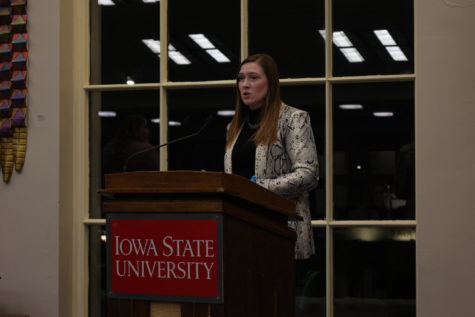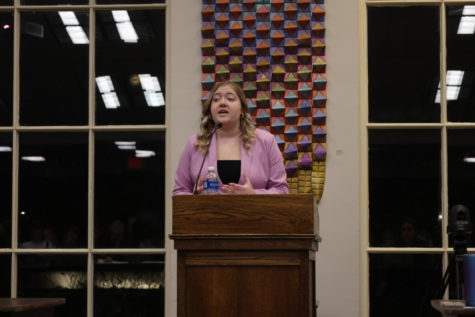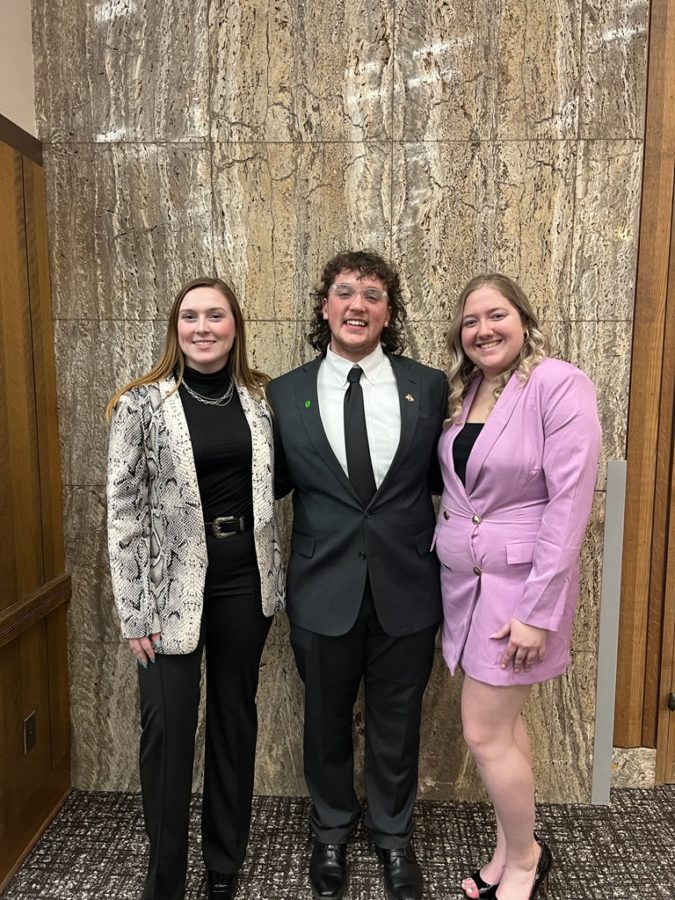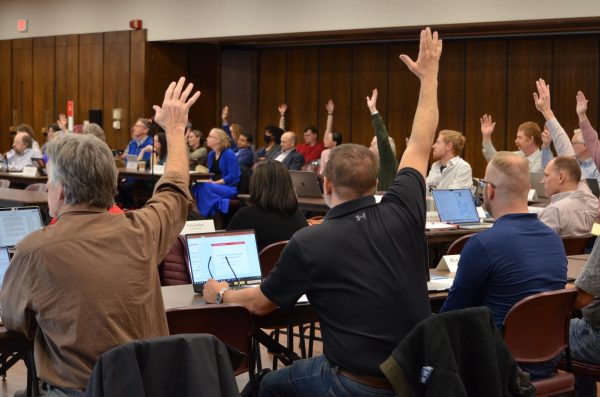Student Government presidential candidates debate two weeks from election
Courtesy of the Election Commission
The candidates for president are Rebecka Larson, a senior majoring in agricultural policy (left), Kit Clayburn, a senior double majoring in animal ecology and biology (middle) and Emily Roberts, a senior majoring in chemical engineering (right).
The three candidates for Iowa State student body president debated for two hours Tuesday, mostly agreeing on the problems facing students and the university, but disagreeing on solutions, while also sharing their campaign platforms.
The candidates for president are Kit Clayburn, a senior double majoring in animal ecology and biology, Rebecka Larson, a senior majoring in agricultural policy, and Emily Roberts, a senior majoring in chemical engineering.
Student Fees
Since 2016, Iowa State enrollment has decreased by 16.2%, resulting in tighter budget constraints for Student Government. Only Larson voiced support for increasing the student activity and service fee to offset the lost revenue saying the money has to come from somewhere.
Clayburn said when considering a fee increase, Student Government should focus on inflation and rising costs rather than decreasing enrollment and that more conversations need to take place, adding that he was not for or against a fee increase.
Roberts agreed with Clayburn that more conversations need to occur but said Student Government should be doing outreach to hear from students.
“It’s a closed meeting– our three voting members are the only people in there, along with our one non-voting member,” Roberts said. “This is the time to ensure you’ve done the outreach to your constituents to know what is needed more, the resources or the money saving.”
The candidates also discussed textbook fees relating to immediate access items. Clayburn said the opt-out process for immediate access items is difficult and students should have more time to opt-out.

“The process to opt-out is a very long process,” Clayburn said. “You have to go through six to seven pages to kind of just get in to opt out. Within that there is such a short time frame from when you start classes to when you have the option to opt-out.”
Additionally, Roberts said previous editions should be allowed for a cheaper alternative, and Larson said professors should state in their syllabus which textbooks are optional and mandatory.
Police
The candidates were asked how Student Government can work with local police departments to cultivate equitable law enforcement in Ames in the wake of the Color of Love’s advocacy for a police-free campus and funding restorative and preventative programs instead.
Citing the recent shooting at Michigan State University, Clayburn said Iowa State University Police Department Chief Michael Newton is also the director of public safety, which he said is especially important.
“Having other knowledge of what they do and what other resources are available on campus can kind of show that ISU Police is not just here to give parking tickets, but to help students feel more welcome around campus,” Clayburn said.
Roberts said Newton has a student advisory board that the University of Northern Iowa and the University of Iowa copied, and that Color of Love should be appointed a seat on that board.
“They obviously are very passionate about reform around policing so I want to put them in the room where they can give that,” Roberts said.

Larson said Ames and ISU Police are wonderful people and that her freshman-year roommate was Newton’s daughter.
“He is so loving, he is so caring, he cares about all the people on campus,” Larson said. “These are safe people. They’re not out here to hurt us. They’re not out here to worsen campus. They are here for us to utilize and they are safe people.”
The candidates, who are all white, were asked how they would advocate for marginalized communities who are disproportionately impacted by policing.
All three candidates cited a study from CR Research Group LC from last year, which concluded there was “negligible evidence of racial bias” in Ames and ISU policing traffic stops. Clayburn said there should be an extension of the study and an explanation for whether certain arrests and stops are for the right reasons.
Roberts said it was more important to focus on how marginalized groups felt during those traffic stops, to which Larson reiterated that Ames and the ISU Police are safe and can be utilized as resources.
“Just because they were marginalized doesn’t mean that was the reason they were pulled over, and it’s having the students or people in the community who are marginalized know that it’s not their fault,” Larson said.
A later question from a student asked Larson whether she was denying police events are racially motivated or have unintended racial biases.
“It just happened to be they were marginalized after the stop had already happened, and they just became a number and a statistic,” Larson said.
Additional Positions
Clayburn said his platform will help inform students of resources and make them feel heard. He said he has the experience for the position with being finance director and being responsible for building gender-neutral bathrooms at Lied Recreation Center.
“With this campaign, we will show students that there are people who will care and will listen because, at the end of the day, listening to each other is when change happens,” Clayburn said.
Clayburn also wants to include trigger warnings in the legally mandated sexual assault notifications to all students without breaking the law in doing so.
Roberts said students feel uncomfortable and their needs are not being met, which she said could be solved by outreach efforts.

“We’re struggling academically because academic advisers are crucial to our experience,” Roberts said. “We’re struggling mental health-wise because we don’t have the counseling support we currently need. We’re struggling to develop that sense of community because we don’t currently feel like we can rely on our peers.”
Part of Roberts’ platform is to create a three-day weekend in October to break up consecutive weeks of school, which she said should lessen alcohol violations and mental health check-ins.
Larson said should she become student body president, she will go to clubs to let them know she exists and is a resource and also wants to implement a first-week feedback form for classes.
Your donation will support the student journalists of the Iowa State Daily. Your contribution will allow us to purchase equipment, send our student journalists to conferences and off-set their cost of living so they can continue to do best-in-the-nation work at the Iowa State Daily.













